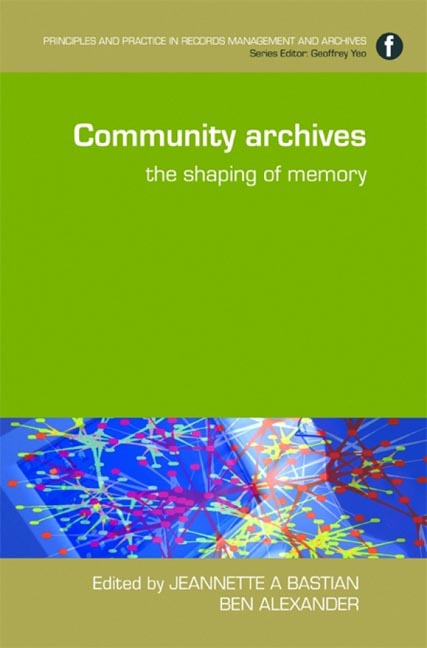Book contents
- Frontmatter
- Contents
- Introduction to the series
- Acknowledgements
- Contributors
- Introduction: Communities and archives – a symbiotic relationship
- Part 1 A community archives model
- Part 2 Communities and non-traditional record keeping
- Part 3 Records loss, destruction and recovery
- Part 4 Online communities: how technology brings communities and their records together
- Part 5 Building a community archive
- 11 ‘All the things we cannot articulate’: colonial leprosy archives and community commemoration
- 12 Overcoming anonymity: Kittitians and their archives
- 13 Always queer, always here: creating the Black Gay and Lesbian Archive in the Schomburg Center for Research in Black Culture
- Conclusion: The archivist and community
- Bibliography
- Index
- Miscellaneous Endmatter
- Miscellaneous Endmatter
- Miscellaneous Endmatter
11 - ‘All the things we cannot articulate’: colonial leprosy archives and community commemoration
from Part 5 - Building a community archive
Published online by Cambridge University Press: 08 June 2018
- Frontmatter
- Contents
- Introduction to the series
- Acknowledgements
- Contributors
- Introduction: Communities and archives – a symbiotic relationship
- Part 1 A community archives model
- Part 2 Communities and non-traditional record keeping
- Part 3 Records loss, destruction and recovery
- Part 4 Online communities: how technology brings communities and their records together
- Part 5 Building a community archive
- 11 ‘All the things we cannot articulate’: colonial leprosy archives and community commemoration
- 12 Overcoming anonymity: Kittitians and their archives
- 13 Always queer, always here: creating the Black Gay and Lesbian Archive in the Schomburg Center for Research in Black Culture
- Conclusion: The archivist and community
- Bibliography
- Index
- Miscellaneous Endmatter
- Miscellaneous Endmatter
- Miscellaneous Endmatter
Summary
Are there cases in which records contain practical information, but in which the real significance is larger and more symbolic? O'Toole, 1993, 238
Introduction
In recent years archival scholars have pondered the complex association between archives and collective memory (see, for example, Taylor, 1982; Foote, 1990; Brown and Davis-Brown, 1998; Brothman, 2001; Craig, 2002; Schwartz and Cook, 2002; Jimerson, 2003; Piggott, 2005a; Piggott, 2005b; Rosen, 2008). Some have examined this relationship in a critical fashion, emphasizing the inherent problems of the claim while dispelling the almost automatic and often unexamined assertion of their synonymity. Calls for more nuanced characterization of archives’ relationship with memory and their communities have gained much attention. Assertions of the archives–memory relationship vary from the critical – ‘connecting archives with memory is, of course, in one important respect, misleading’ (Harris, 2001, 5; Craig, 2002, 278) – to the convinced – ‘Memory, like history, is rooted in archives. Without archives, memory falters, knowledge of accomplishments fades, pride in a shared past dissipates’ (Schwartz and Cook, 2002, 18). The various articulations of the problematic contexts and apparent limitations of records, archives and archivists either as evidence, sources, inspiration, shapers or mediators of memory prompt further reflection. They also underscore the need to find more evidence of how archives (as both social institutions and collections of records), archivists and record-keeping functions might figure in the construction and remembrance of the past by societies, groups or communities.
A few terms have been suggested in the attempt to illustrate this association. Among these are Laura Millar's (2006) ‘touchstones’ which refers to how records function to trigger memories and the recollection of past events. Margaret Hedstrom uses ‘interface’, a term often associated with computing technology, to describe the capacity of archivists as intermediaries between documents and their users that ‘enable, but also constrain, the interpretation of the past’ (Hedstrom, 2002, 22). Similarly, Robert McIntosh puts forward the notion of archival ‘authorship’ to emphasize the mediating role of archivists in memory creation as they ‘practice a politics of memory, a determination of what will be remembered’ (McIntosh, 1998, 18). Ref lecting on the archival experiences in South Africa in its transition from apartheid to democracy, Verne Harris concludes that records comprise mere ‘archival slivers’ of the events and processes that they are supposed to embody and reveal.
- Type
- Chapter
- Information
- Community ArchivesThe shaping of memory, pp. 197 - 220Publisher: FacetPrint publication year: 2009
- 5
- Cited by



